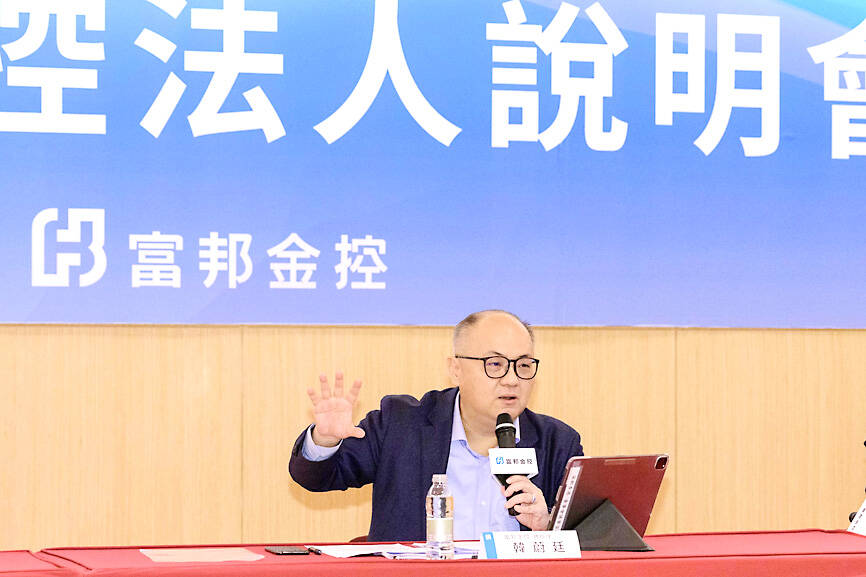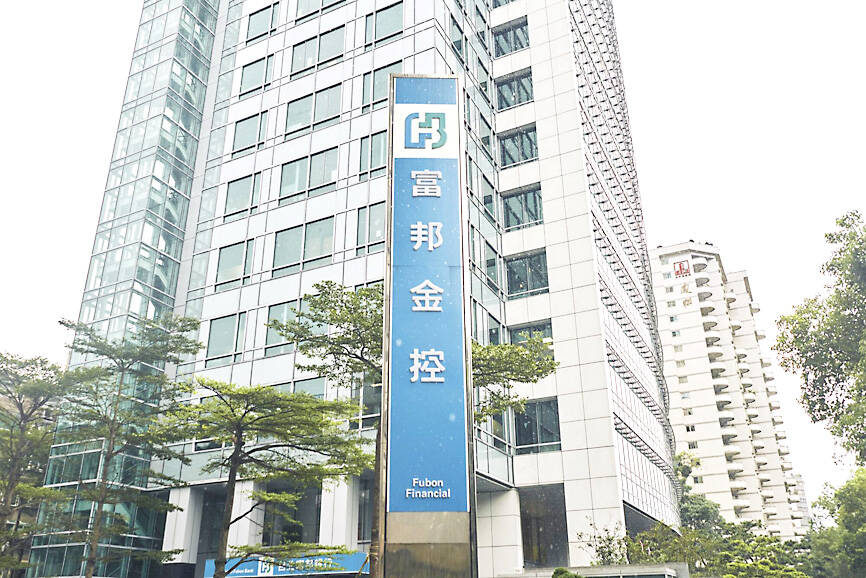Fubon Financial Holding Co (富邦金控) yesterday projected stable profit growth for the rest of this year even though net income in the first half shrank 38.2 percent annually to NT$42.9 billion (US$1.35 billion).
The conglomerate made the cautiously optimistic remarks during an investors’ conference after major subsidiaries reported that business improved amid a relatively favorable operating environment compared with last year.
Fubon Financial president Jerry Harn (韓蔚廷) said he believed China would introduce more stimulus measures to help its stalling economy.

Photo courtesy of Fubon Financial Holding Co
The group estimated its exposure in China at NT$840 billion, but the net sum would be NT$340 billion after factoring in NT$500 billion of assets at its Chinese banking subsidiary Fubon Bank China (富邦華一銀行).
That translates into a small 3 percent of Fubon Financial’s overall assets of NT$10.9 trillion, Harn told investors.
Fubon China incurred minor losses in the first six months after raising its general position at the request of Chinese financial regulators, officials said, adding that the conglomerate has no exposure to troubled Chinese developers.

Photo: An Rong Xu, Bloomberg
The nation’s most profitable financial conglomerate attributed the cash woes plaguing Chinese developers and local governments to years of COVID-19 lockdowns and the property sector’s overexpansion, but said it does not expect the problem to escalate into a financial storm.
“We have been cautious about China’s property sector and have focused on lending to Taiwanese firms there and Chinese national enterprises,” Harn said.
Fubon Life Insurance Co (富邦人壽) would see its income bolstered this quarter by cash dividends, which would be higher than last year, officials said.
The insurer hesitated to lower its hedging cost projection, saying they would amount to 100 to 150 basis points this year and would be higher than last year, as major central banks have no intention of easing interest rates in the near term.
By contrast, Taipei Fubon Bank (台北富邦銀行) might see its wealth management business grow 20 percent this year, faster than earlier predicted, officials said.
“Investment sentiment has improved much this year due to fewer black swan events,” officials said, adding that the recovery in financial markets at home and abroad also lent support.
While the group’s debt position remains in the red, stock holdings have turned positive, officials said.
Like other lenders in Taiwan, Taipei Fubon Bank raked in hefty profits from its currency swap operations, which might continue to generate earnings ahead under a similar environment, officials said.
Still, Fubon Insurance Co (富邦產險) accumulated losses of NT$3.22 billion in the first half due to lingering COVID-19 claims, although it swung to profit in April, officials said.
Things would gradually brighten at the subsidiary, the nation’s biggest with a market share of more than 20 percent, officials said.

UNCERTAINTY: Innolux activated a stringent supply chain management mechanism, as it did during the COVID-19 pandemic, to ensure optimal inventory levels for customers Flat-panel display makers AUO Corp (友達) and Innolux Corp (群創) yesterday said that about 12 to 20 percent of their display business is at risk of potential US tariffs and that they would relocate production or shipment destinations to mitigate the levies’ effects. US tariffs would have a direct impact of US$200 million on AUO’s revenue, company chairman Paul Peng (彭雙浪) told reporters on the sidelines of the Touch Taiwan trade show in Taipei yesterday. That would make up about 12 percent of the company’s overall revenue. To cope with the tariff uncertainty, AUO plans to allocate its production to manufacturing facilities in

Taiwan will prioritize the development of silicon photonics by taking advantage of its strength in the semiconductor industry to build another shield to protect the local economy, National Development Council (NDC) Minister Paul Liu (劉鏡清) said yesterday. Speaking at a meeting of the legislature’s Economics Committee, Liu said Taiwan already has the artificial intelligence (AI) industry as a shield, after the semiconductor industry, to safeguard the country, and is looking at new unique fields to build more economic shields. While Taiwan will further strengthen its existing shields, over the longer term, the country is determined to focus on such potential segments as

TAKING STOCK: A Taiwanese cookware firm in Vietnam urged customers to assess inventory or place orders early so shipments can reach the US while tariffs are paused Taiwanese businesses in Vietnam are exploring alternatives after the White House imposed a 46 percent import duty on Vietnamese goods, following US President Donald Trump’s announcement of “reciprocal” tariffs on the US’ trading partners. Lo Shih-liang (羅世良), chairman of Brico Industry Co (裕茂工業), a Taiwanese company that manufactures cast iron cookware and stove components in Vietnam, said that more than 40 percent of his business was tied to the US market, describing the constant US policy shifts as an emotional roller coaster. “I work during the day and stay up all night watching the news. I’ve been following US news until 3am

COLLABORATION: Given Taiwan’s key position in global supply chains, the US firm is discussing strategies with local partners and clients to deal with global uncertainties Advanced Micro Devices Inc (AMD) yesterday said it is meeting with local ecosystem partners, including Taiwan Semiconductor Manufacturing Co (TSMC, 台積電), to discuss strategies, including long-term manufacturing, to navigate uncertainties such as US tariffs, as Taiwan occupies an important position in global supply chains. AMD chief executive officer Lisa Su (蘇姿丰) told reporters that Taiwan is an important part of the chip designer’s ecosystem and she is discussing with partners and customers in Taiwan to forge strong collaborations on different areas during this critical period. AMD has just become the first artificial-intelligence (AI) server chip customer of TSMC to utilize its advanced